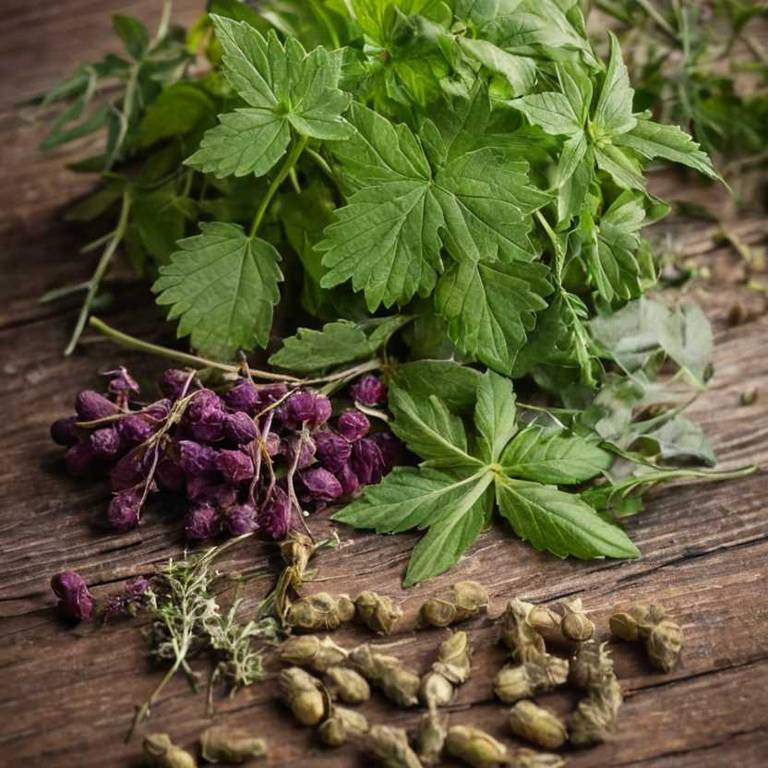Common Grape (Vitis vinifera)
Common Grape (Vitis vinifera) is a member of the Vitaceae family, native to Mediterranean Region, Southern Europe, and Middle East. Traditionally, its fruits, leaves, and bark have been used for infusions, decoctions, and culinary uses.
This herb is particularly valued for its tonic, diuretic, and anti-inflammatory actions, and has a long history of use in european herbal medicine, mediterranean herbal traditions, and traditional chinese medicine.

Quick Facts / Key Information
| Common Name | Common Grape |
|---|---|
| Scientific Name | Vitis vinifera |
| Plant Family | Vitaceae |
| Genus | Vitis |
| Species | vinifera |
| Native Range | Mediterranean Region, Southern Europe, Middle East |
| Plant Parts Used | Fruits, Leaves, Bark |
| Primary Medicinal Actions | Tonic, Diuretic, Anti-Inflammatory |
| Primary Traditional Systems | European Herbal Medicine, Mediterranean Herbal Traditions, Traditional Chinese Medicine |
| Historical Preparation Methods | Infusion, Decoction, Culinary Use |
Botanical Identity
- Scientific Name
- Vitis vinifera
- Common Name
- Common Grape
- Synonyms / Alternative Names
- European Grape, Vine Grape, Vitis Vinifera
- Plant Family
- Vitaceae
- Genus
- Vitis
Botanical Description
- Growth Habit
- Perennial vine.
- Height
- It typically reaches a height of 2 to 5 meters.
- Leaves
- Simple leaves with entire margins, upper surface glabrous and dark green, lower surface pale green with prominent stomatal bands.
- Flowers
- Inflorescences are racemose with actinomorphic flowers having five sepals, five petals, and five stamens, with white to greenish-yellow corollas and persistent calyx.
- Stems
- Erect, herbaceous, four-winged, glabrous, with opposite, simple branching.
Traditional Uses / Historical Use
Traditional Systems
- European Herbal Medicine
- Mediterranean Herbal Traditions
- Traditional Chinese Medicine
- Japanese Kampo Medicine
Historical Preparation Methods
- Infusion
- Decoction
- Culinary Use
- Tincture
Medicinal Actions
- Tonic
- Traditionally described as a soothing tonic, for long-term use contexts.
- Diuretic
- In herbal literature, noted as a calming diuretic, in fluid-regulation contexts.
- Anti-inflammatory
- Historically regarded as a gentle anti-inflammatory, in inflammation-focused discussions.
- Bitter
- As described in traditional systems, a mild bitter, for digestion-related formulations.
Active Compounds
- Flavonoid
- A group of naturally occurring compounds commonly present in many flowering plants.
- Phenolic Acid
- A class of aromatic plant compounds commonly found in leaves, seeds, and stems.
- Anthocyanin
- Pigment molecules widely distributed in colored plant tissues.
- Tannin
- High-molecular-weight phenolic compounds found in many plant species.
Modern Research Overview
Scientific literature concerning this plant spans multiple areas, including phytochemistry and laboratory research. Detailed analysis of published studies is not included at this time and will be added as part of future editorial expansion.
Safety & Contraindications
- General Precautions
- The use of this herb may warrant general caution in certain situations.
- Contraindications
- There is insufficient evidence to determine specific contraindications related to this herb.
- Allergies
- Allergic reactions associated with this herb have not been well documented.
- Drug Interactions
- Interactions between this herb and prescription medications are not clearly established.
- Toxicity
- The toxicity profile of this herb has not been clearly established.
- Pregnancy & Breastfeeding
- Information addressing pregnancy and breastfeeding-related safety for this herb is limited.
Preparation & Usage Methods
- Infusion
- Water is poured over plant material and allowed to steep before straining.
- Decoction
- A preparation method involving prolonged boiling of roots, bark, or dense plant material.
- Poultice
- This method uses direct contact between plant material and the skin.
- Culinary Use
- Plant material is incorporated into food or beverages for flavor or aroma.
- Tincture
- Alcohol is used as a solvent to extract plant constituents over time.
Growing, Harvesting & Storage
Growing / Cultivation
- Soil
- Prefers loamy soil with well-drained conditions. Typically grows best in organically rich soils.
- Sunlight
- Thrives in full sun. Tolerates full sun to partial shade.
- Watering
- Prefers well-balanced moisture levels. Tolerates periodic dry conditions.
Medical Disclaimer
The information provided on this page is for educational and informational purposes only. It is not intended to diagnose, treat, cure, or prevent any medical condition. Always consult a qualified healthcare professional before using any herb for medicinal purposes.